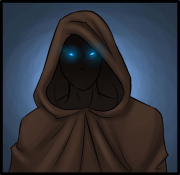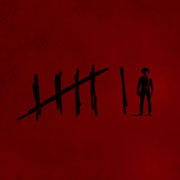|
Wait, do you mean the game doesn't have rules for starting the game over level 1 or does it have rules for how to earn experience and then not a single rule about what the hell you can spend the XP on and how to progress a character?
|
|
|
|

|
| # ? Apr 16, 2024 04:55 |
|
The former. It's obviously easy enough to just hand the players some amount of XP and let them make a character with that, but the book doesn't actually say that anywhere, or give any guidelines on what sort of equipment higher-level characters should have. I don't know if it's because that stuff was originally in the DMG or what, but it's a bit of a bother. Edit: Went back and edited a bit, hopefully it's clearer.
|
|
|
|
 Rifts World Book 17: Warlords of Russia, Part 4: "He works his subjects hard, and provides them with little in the way of luxury or shared wealth, but is fastidious in destroying supernatural beings and evil practitioners of magic, as well as inhuman looking D-bees and gypsies (he can't stand 'em)." The Warlords of Russia So, we get one, two... seven paragraphs explaining why the Warlords aren't seen in person (they're all the obvious reasons, FYI) and how, when they are, there's almost always pageantry involved. Also if you give them lip they might try and make you leap a horse over an unleapable gorge and fall to your doom or some other similarly cruel trial. But that horse didn't do anything! Dick move, Warlord.  Not every Warlord paints a picture. Warlord Alekseyevna The oldest of the Warlords at 101 years of age, becoming a full cyborg has lengthened Yuri Garald Alkseyevna's lifespan. He used to be really cunning and ruthless, having orchestrated the downfall of two of the original ten Warlords. He's weary of war, though, and finds political machinations tiresome. He does like gardening, though! For the most part, he's content with the kingdom he's built. Generally speaking, he's growing increasingly behind the times. Generally speaking, he's behind the times, and demands hard work of his subjects, but is also extremely dedicated to annihilating supernatural threats. And also ethnic wanderers (yes, that train of prejudice will just keep on rolling through these books). And he's kind of sexist. Generally speaking, the only reason nobody's tried to oust him is that he's far enough the North that anybody who invades would struggle to manage the rough tundra region. He's a 12th level Dimiye Solati (that should be "Soldati Dimiye") that has no negative attributes and gets to be a cyborg at the same time without abandoning his class, is a bit of a genius, and has no art. He no doubt hates whatever music kids listen too these days.  Can you get cyber-cancer? Warlord Burgasov Pyotr Karol Ivonavich, an accomplished "War-Knight", was granted a new surname and position of Warlord thanks to a deathbed proclamation by Mikal Burgasov, the previous Warlord. Mikal's sons didn't truck with this, so Pyotr killed them after the months of ensuring battle. Then he invaded another Warlord, promising no mercy to those who didn't surrender, which apparently broke their resolve due to his reputation for ferocity and honesty. Also he killed anybody who hadn't openly surrendered (Warlord included) because he's supposed to be a mega-ruthless "I'm only gonna say his once" sort. In any case, he's very strict but feared, and runs most of Estonia. He gets the title "The Bear of Moskva" and apparently has a bunch of macho soldiers that love him, and his main concern is dealing with gargoyles threatening from the St. Petersburg volcano. However, he also has rebels in the region where he invaded, and we're told "some will even go as far as to consider an alliance with supernatural evil". Well, whatever, Pyotr's a merciless mass murderer, so everything is relative. Also, he hates fun. I'm not making that up. He's a 10th level War-Knight that has ridiculously high attributes and gets to a (partial) cyborg without losing his class in spite of how the cyborg rules work. He's strong-willed and immensely charismatic, but this is no doubt balanced by the fact he's slightly less attractive than average.  Absolutely posing for the painting. Warlord Kolodenko A "Mountain King" who inherited his position, Kolodenko is the most "noble" of the bunch in more ways than one. He's more of a politician and leader than a general, and doesn't particularly care for bloodshed. Having gone to college in the New German Republic, he was trained as a cybernetic engineer, and he has underworld connections to NGR manufacturers. However, the fact there's a bunch of gargoyles and demons between his land and Germany keeps open trade at an impasse. (Nevermind that the NGR has air transport.) He loves science and manners. Based out of the Caucasus Mountains, Kolodenko's forces are small, but he has strong support from the neighboring and independent Cossack population. And if you guessed the Cossacks have returned to their 18th century ways and are homogenized rather than representing a variety of connected peoples - you earn a point and a drink. His support of the Cossacks have earned him the enmity of Warlord Solokov and Warlord Orloff, both of which would love to kick the nomads out and claim their land. He has an ongoing low-intensity conflict with Solokov that largely seems to be going in his favor, because Solokov is a bit dim. A 9th level Operator who actually isn't a cyborg, Kolodenko makes up for it with practically unrollable attributes, including exceptional intelligence, affinity, strength, process, and speed. That being said, of all the Warlords so far, he's the only one that's come across as a pretty decent guy worth following. If there's an unambiguously heroic warlord, it's this guy.  "I'm a good guy. This is my good smile." Warlord Orloff ... is a generic villain who murdered his own dad to get his position, and is an oppressive bully who loves conquest. He tried to conquer the Sovietski, but only got a fourth of the way through before being stymied, and only agreed to a ceasefire under the pressure of Warlords Burgasov, Serjyev, and Romanov. Because of that, he wants revenge against those Warlords, particularly Romanov because she won't marry him. Also his father had befriended some nice D-Bees who gave their country alien technology, but Orlorff killed them because he figured he already had all their technology and gently caress those guys. He has one of the largest armies with a high percentage of full conversion cyborgs, and if you're guessing they put their e-dicks where they aren't wanted... Rifts World Book 17: Warlords of Russia posted:They frequently engage in all types of deplorable conduct during raids and against the enemy, from torture and murder, to raping and pillaging. ... well, you earn a point and a drink. He's based out of Donetsk but has a wide slice across Western Russia. He's known as the "Snowdemon", "Orloff the Mad", and "The Butcher". He runs his land on terror, brutality, and giving no fucks, not necessarily in that order. He's a 8th level heavy 'borg, but unless you think he's following the rules, he gets a bunch of skills he normally couldn't because of "special training.". He at least has a slightly-lower-than-normal mental endurance to go with his genius I.Q. (How the gently caress does have an I.Q. of 160? How?!). He's the mostest boringest of all the Warlords.  ... and the girl! Warlord Romanov "Sonya the Great" claims to be descendant of the Romanov Dynasty, which seems intensely unlikely. Nonetheless, she was a peasant who had psychic powers awaken and have visions of Romanov ghosts who told her to go "make her destiny". She joined the local war camp (I guess she was invited? Maybe?) and worked her way from cook to war-knight to heavy conversion 'borg. From there, she discovered her Warlord had made a deal with a demon, challenged him to a duel, and then stabbed him with a special demon slaying rune dagger that she got from-  - and then people somehow realized that he was really corrupted because I guess a bunch of random observers know what a special demon slaying rune dagger looks like and what it does-  - and they gunned down the Warlord and everybody declared her the new Warlord and a super winner. Thanks, random plot dagger! Either way, she's become a fair and just Warlord, and has rebuffed attacks on her domain. Her dream is to find a way to unite Russia under her special Tsarblood. She's based out of Keiv, and has the best manufacturing center, and most of her troops treat the common folk extremely well. Though she has romantic inclinations towards Kolodenko, they're separated by the domains of Orloff and Sokolov. Apparently, Serijev intended to manipulate her, but has come to like her nonetheless. Ultimatley, she's supposed to be the heroic paladin of the Warlords. She's a 9th level 'Borg - well, a "9th level Heavy Borg and Warlord, ex-War-Knight", because nothing can be stated simply. She has the most ridiculous stats - a genius intelligence and a maximum possible affinity for a human. But, you know, the "R" and the "G" words haven't come up in this description and that's the low bar I'm content with seeing cleared at the moment. She seems perfectly decent for a warlord.  But seriously, can cyborgs get cancer? Warlord Serijev The sleazy weasel of the Warlords, Serijev apparently somehow stole his position, and is basically a master of spies and the underworld. He's willing to do anything, but uses his alliance with Romanov to try and clean up his image publicly as a "reformed scoundrel". He isn't particularly reformed, though, and uses assassins and secret agents to maintain his power, and runs assassination and exortion rings, amongst other things. He's based out of Minsk, and has castle that's essentially a Bond villain hideout. Though he admires Romanov and wishes he could be as straightforward as she is, he essentially doesn't have the spine for it and will likely leave her hanging in the wind at some point. Apparently he has allies amongst the Sovietski, but has to be careful they don't know about his underworld activity there. In general, he handles most of the other Warlords well, save for the pair of baddies - Orloff and Sokolov. In addition, Kolodenko seems to be on to his schemes, and may figure out Serijev's still up to his old tricks. A 10th level Assassin (not a class) and Warlord (not a class), if you guessed by now he has a genius intelligence, you'd be correct! He's a partial 'borg but never had to switch his class, a special case NPCs seem to continually dance around here. And his attributes are an unrollable farce, starting with 20, 20, 23. You know, the usual. (Sure, it makes some sense for the warlords to be exceptional, but so much more so than PCs...?)  Well, it's the 90s, cyborg-with-an-eyeglint box checked. Warlord Solokov A psychopathic "killing machine" that got his Warlordship through a duel, he's basically the more cunning and calm version of Orloff. He believes he's exceptionally lucky on account of surviving this far, or at least did until he started warring with Kolodenko and losing. Right now he's shaken and starting to unravel into paranoia involving Kolodenko, making him more unpredictable and violent. He's also big on exterminating foreigner, and would like to wipe out the Cossacks... because. He wanders around his territory, too paranoid to keep a fixed base. Essentially, he's the head of a tremendously large group of bandits. He's has an alliance with Orloff, and he's clearly the dominant one... despite being the stupidest of the Warlords by far. He's a one-note murderer, mostly. An 11th level 'Borg, he miraculously has average attributes because I guess even the writers didn't like him very much. A bland writeup for a bland character, but I guess paranoia is a hook to hang an interaction on. I'm So Glad to Be Done With These Next: Finally, you can play the poo poo farmer of your dreams. Alien Rope Burn fucked around with this message at 17:32 on Aug 12, 2018 |
|
|
|
Siivola posted:The former. It's obviously easy enough to just hand the players some amount of XP and let them make a character with that, but the book doesn't actually say that anywhere, or give any guidelines on what sort of equipment higher-level characters should have. I don't know if it's because that stuff was originally in the DMG or what, but it's a bit of a bother. Unless they added rules, then you won't be finding any guidelines to starting above 1st level. And the reason given by TSR was "Because starting at level one is so important to developing a hero and we can't deny players that crucial experience." This is probably the biggest weakness of 2nd ed - not the lack of advanced character starts per se, but the tone and attitude that led to it. It was patronizing at best. At worst, it was sadistic. "Here are several varieties of rolling up your character, if you want to be a munchkin, but we feel that 3D6 down the line really opens up the mind to creative role playing!" "Almost no one can play a Paladin, but it's one of the longest entries in the class chapter, and half the rules are about the hows and whys of them losing their class abilities and becoming lovely fighters. Not that we have a problem with Paladins! Pay no attention to all the settings and supplements where that class is routinely depicted as the biggest assholes ever." "A young dragon gives too much treasure to a level-appropriate party, but rather than adjust the treasure in its hoard, we suggest having invisible bandits fiat reduce the parties haul to an acceptable amount". "Here are detailed instructions on how kobolds would enslave and torture your players. Wouldn't that be a unique roleplaying experience? Be sure to break the spellcasters fingers!" and so on, and so on. Its to the point that I honestly think part of the reason 3rd edition was so readily accepted despite its myriad problems was because it mostly dropped all this passive-aggressive bullshit from the last edition.
|
|
|
|
quote:Next: Finally, you can play the poo poo farmer of your dreams. Sweet! Finally my Vagabond can trade in his-vibro bindle on a stick for a vibro-shovel! The Warlords were as crappy as I remembered. I am glad the one lady 'borg is still hot enough people want her, though. Good for her!
|
|
|
|
Dawgstar posted:Sweet! Finally my Vagabond can trade in his-vibro bindle on a stick for a vibro-shovel! SD Swords to Mega Plowshares
|
|
|
|
Dawgstar posted:Sweet! Finally my Vagabond can trade in his-vibro bindle on a stick for a vibro-shovel! Shovel Cyber-Knight.
|
|
|
|
Barudak posted:SD Swords to Mega Plowshares Well, Tarnow and it's mystic rock are just across the western border.
|
|
|
|
Hey, a quick non-update on For Gold & Glory! I just finished writing up the hireling chapter which means I'm done with the core rule chapters! Now all that remains is… Um. Almost 300 pages of appendices.  I'm absolutely not going to go through all of the spells, monsters and magic items in the book, so are there any particular ones you'd like me to showcase? I'm absolutely not going to go through all of the spells, monsters and magic items in the book, so are there any particular ones you'd like me to showcase?
|
|
|
|
Siivola posted:Hey, a quick non-update on For Gold & Glory! I just finished writing up the hireling chapter which means I'm done with the core rule chapters! Now all that remains is… Um. Almost 300 pages of appendices. Some monsters would be cool.
|
|
|
|
I mean, I am going to do updates for the appendices. I just can't bear the thought of trying to cover every kind of dragon and every kind of magical robe, is all. 
|
|
|
|
Anything particularly silly is always a good option.
|
|
|
|
Too bad this wasn't a BECMI reconstruction. They had some amazing critters in those books.
|
|
|
|
Just pick out whatever you think is coolest. When I go through massive lists of random poo poo I make notes of what i find interesting, funny, or absent
|
|
|
|
Yeah, when I have a big list of stuff, I try to give myself a fixed amount of things to cover per level or overall. I don't always succeed, but there's no way you'll see me cover every spell in Mystic Russia. I will cover every bee magic spell though, because seriously. It's bee magic.
|
|
|
|
Siivola posted:Hey, a quick non-update on For Gold & Glory! I just finished writing up the hireling chapter which means I'm done with the core rule chapters! Now all that remains is… Um. Almost 300 pages of appendices. Top 10 or 20 or whatever of each is fine. Whatever grabs your fancy.
|
|
|
|
Miscellaneous :clap: magical :clap: items :clap:
|
|
|
|
|
 For Gold & Glory: Chapter 12: Treasure, Magical Items, and Research This isn't the chapter with the magical items, those are all in appendix C. This chapter is all about how to make those things instead. quote:Treasure is any item the characters acquire on their journey that has value  The chapter is titled "Treasure", but there isn't much said about non-magical treasure we didn't already cover when we looked at coinage. Creatures might have valuable stuff! Non-intelligent creatures probably don't, but maybe a shark's eaten something worth selling? Better gut it to make sure! (Ew.) The bestiary in appendix C lists treasure codes for creatures encountered, but the actual treasure lists are in appendix B. Just like encounters, treasure can be both planned and randomised. Planned treasure should "reward or entice" players. Random encounters should carry some random amount of treasure with them, but the book repeatedly reminds us that intelligent monsters only carry useful stuff and leave their valuables in their lair. So if you roll any useless valuables, remember to put them down somewhere in the dungeon I guess? Welcome to Honest Bobbe's Magick Shoppe! quote:There is little to no market in magical items  Magical items usually appear as mundane things, although divination magic can used to figure out what the hell you've found. Good thing all wizards begin knowing detect magic, otherwise figuring if you've found anything magical to begin with would be a huge pain in the rear end. Cursed items are designed to fool divination magic because whoever makes them is a complete dick. When the curse activates, the character can not get rid of the item until the curse is broken. It will keep reappearing in their There's a lot of hype about magical items and they're totally rare you guys so nobody would bother dedicating an entire shop to them! They probably have a lot of sentimental value! And so, their monetary value is completely up to the GM, although XP value times 100 gp is suggested. (What's the XP value? Dunno, but we'll find out eventually.) Most people don't actually have hundreds of gold pieces in liquid cash, so exchanging magic items for stuff like plots of land, titles or simply other magic items is suggested. Magic items typically require a full round to activate. Enchanted weapons, armour and such automatically grant their benefits and characters will realize what's happened. The book makes a big deal about figuring out all the functions and commands of a magic item, which sounds like a bit of a faff. Too many magic items can't be worn together. You can only wear one ring per hand, one pair of bracers, a helmet or a hat but not both, and so on. Wearing too many will make them all turn off. You have to wear both pairs of a matched set of boots. The book isn't entirely clear if you can wear a magical cloak over a magical robe or not, but you could in Baldur's Gate so I'm gonna go with "yes". A wizard did it Spell casters can make magic items depending on their level. This isn't mentioned anywhere in the class descriptions. Wizards learn to brew potions at 7th level while clerics have to wait until 9th, and both can scribe scrolls at 7th level and from level 11 onwards they can create all other magic items. The player should describe what they want to make, and the GM should lead them on the appropriate adventures. Magical scrolls are the easiest magical item to create. You only need a few days of peace and quiet, and about as much money as it would cost for a wizard to scribe that spell into their spell book. How much is that? Who knows! The character class descriptions don't say anything about learning new spells so it's probably in appendix A. To scribe a scroll, the caster needs to know the spell, and own the appropriate quill, ink and paper. The inks might require special sympathetic ingredients to create. It takes a full day per spell level to scribe the spell onto the scroll, and any "prolonged interruption" beyond eating, sleeping and potty ruins the scroll. When the process is finished, the GM should secretly roll a percentage die for success. The odds are okay (80%, minus the spell level, plus the character's level) but if the check fails, the scroll is cursed. Fun.  Joseph Wright of Derby: The Alchemist Discovering Phosphorus, detail. 1771. According to the book, potions are about twice as expensive as scrolls but require less time to brew. Unlike scrolls, they require access to a magical laboratory or a powerful holy site. A potion is basically a spell in a bottle, so the caster must again know the spell they're using. Potions require mundane ingredients costing between 200–1000 gp, plus any arbitrary special ingredients. The brewing process takes a number of days equal to the cost in gp divided by 100, so 2–10… Which means the process takes roughly as long as scribing scrolls, unlike promised. Incidentally, a wizard's lab requires at least 2000 gp's worth of equipment, plus 10% a month to replace worn-out equipment. Rent not included.  Crafting other magical items is more involved, particularly if you're a wizard. Whereas scrolls and potions might require stuff like ashes from the watch captain's torch or the tail of a chameleon, creating a properly magical item can be an entire adventure that spans weeks or even months of in-game time. To begin with, the magical item requires a flawless, blinged out vessel created by a master craftsman, costing some thousands of gold pieces. This certainly helps with identifying magical items in a hoard of loot. In addition, magical components such as esoteric oils or gem dust are necessary to prepare the vessel to accept the magic, and these should cost at least 500 gp. Finally, a laboratory shielded from magical energies is required to prevent the item from becoming contaminated with unwanted magic. Once the vessel is ready, the process begins with the spellcaster casting enchant an item on it. Then they have 24 hours to cast any magic they want to imbue into the item. A wand of fireballs is a simple matter of stuffing it full of fireball spells, but weirder items might require esoteric components or straight up researching a new spell. For each spell cast into it, the item rolls a save vs. spell as if it was the caster because… Making things would be too easy otherwise? If the magical effects are meant to be permanent instead of having charges, a permanency spell is required. There's a 5% chance of permanently losing a point of constitution when finalizing the creation of a magical item. After that, a final percentage check is rolled to see if everything went well or if the item turns out cursed. It's harder than the ones for scrolls or potions because… gently caress you for trying to get your hands on a custom magical item I guess? It's weird. After that, there's some more rolls to see if the magical item is actually a super-powered "archetype" item. (Unlikely) Priests, on the other hand, have an easier time! Coming up next: Hirelings and Henchmen!
|
|
|
|
 Rifts World Book 17: Warlords of Russia, Part 5: "Their aid may also be enlisted in the search for people lost in the woods or stolen by gypsies or fearsome woodland beings." So, we get a trenmendous list of classes you could use in Russia along with book references, so you can get caught up on essential titles like Rifts® Scotland. Oh, that doesn't exist and has never existed? Well, just forget about that one.  Pictured: what you'd like to be when you play a Bogatyr. Not Pictured: the terrible reality. Adventuring ... O.C.C.s, that is. These are the "Adventurer" classes for this book. As always, the % is your chance of rolling the attributes necessary to play that class as a human character.  "Will you stop rising? I'm trying to read, here."
 "Let me tell you about the man who doomed his party by choosing a suboptimal class. That man... was me!" Wait, wasn't the Ecto-Hunter supposed to be in Mystic Russia? Well, they got here early, I guess. Next: The Cossacks: a people, an occupation, and a class, all together at last in one convenient package.  "Finally, time to show everybody what I can't do!" Alien Rope Burn fucked around with this message at 12:03 on Aug 13, 2018 |
|
|
|
Is there a RIFTS USA where Bio-Pilgrims battle Cyber-Confederates by doing sick tricks on their Vibro-Skateboards?
|
|
|
|
What I love about Riftssia is the random Romani hatred. I thought Imperial Russia (...and Soviet Union) had it in for the Jews? Like, hating Romani is the most random thing to crop up in a cyber-fantasy setting.
|
|
|
|
Hating Romani is the free space for European racism bingo.
|
|
|
|
Wapole Languray posted:
Isn't being a homeless guide contradictory? unlike the other examples it's physically impossible to not practice what you preach, because what you're advising is how not to literally die on the streets.
|
|
|
|
The Skeep posted:Isn't being a homeless guide contradictory? unlike the other examples it's physically impossible to not practice what you preach, because what you're advising is how not to literally die on the streets. Yeah by that logic that example should be a guy who works at a homeless shelter or something. Someone who does have a home but knows from past experience how to help those who don't.
|
|
|
|
The Lone Badger posted:Is there a RIFTS USA where Bio-Pilgrims battle Cyber-Confederates by doing sick tricks on their Vibro-Skateboards? Well, I've already covered the US stuff in my previous reviews for Rifts, Rifts Sourcebook, Rifts Mercenaries, and Rifts World Books 10 through 16. But I know later books (the Dinosaur Swamp duology, covering the American Southeast) have some kind of swamp yokels with eco-magic and Civil War ghosts. But no swamp skateboards. Granted, I've only skimmed through those books, so there could be a swampboarding spell or something I overlooked. JcDent posted:Like, hating Romani is the most random thing to crop up in a cyber-fantasy setting. It definitely feels weird for it to persist (and, if anything, intensify) over three centuries of cultural change, particularly after everybody had to flee Russia, find a home elsewhere for 80 years, then come back. Granted, I would be unsurprised if the pre-rifts Soviet revival continued persecuting Romani (as their distinct culture was always seen as a threat to the Soviet party line of homogeneity), but we don't really know. Granted, that's almost certainly me thinking too hard about things when the real answer is Siembieda seems to be aiming for an image and justifying things backwards from that, rather than building a setting narratively.
|
|
|
|
Alien Rope Burn posted:Well, I've already covered the US stuff in my previous reviews for Rifts, Rifts Sourcebook, Rifts Mercenaries, and Rifts World Books 10 through 16. That and the insistence that you know that rape is on the table, in case someone accidentally thinks that marauding quasi-bandit warlords might not stoop to rape in all of their looting, pillaging and general oppressing. Have to remind you, specifically, that sex crimes happen alongside regular crimes.
|
|
|
|
7th Sea 2: The Crescent Empire - Not Hebrew Dibre is the shared language of all Sarmions. It is an extremely old language, probably the oldest of all currently living ones. It is rife with spiritual and mystical meanings, and it is not only the language of Yachidi prayer but of the shared Sarmion sorcery known as Chozeh. Sarmions believe that all words have important meaning, and therefore that words must be chosen carefully. It is commonly believed that all people are born with a limited supply of words for their life, though each person has a different amount, and so words must not be wasted. Because language is inherently sacred, they also believe that lying is the greatest insult (if you get caught), and that to use Dibre for evil profanes it and requires penance. Dibre is notable for its difficult back-of-the-throat 'ch' sound, which most non-Sarmions find very hard to pronounce. While Sarmion has often suffered at the hands of others, its people adore any chance they can get to celebrate the beauty of life. Every holiday or event is turned into a big party, and drinking is a favored pastime for any who are religiously allowed to, with toasts being grand affairs for impromptu speeches to good fortune. That does not mean, however, that Sarmions don't recognize their past. They are known for sardonic wit, often joking about their ability to survive, no matter how close they come to being annihilated. Their celebrations typically last hours or days and are filled with dance, food, music, song and stories. The food is important - food is a huge part of the Yachidi religious identity, after all. As part of the Yachidi covenant with Theus, they do not eat meat and dairy together, and they don't eat meat often in the first place, which has led to some innovative cooking. Most in Sarmion will only eat animals that have lived a good and full life, so most farmers keep only a limited amount of livestock, which are tended to with extreme care. Vegetarian dishes are common, made from chickpeas, lentils and other legumes instead of using the usual chicken, lamb or beef meals common elsewhere in the Empire. Dips made from chickpeas or aubergine are common, especially those made without dairy products, because those can be mixed with meat. Outside of a Sarmion's direct family, the most important social identifier they have is the tribe. Sarmion is split into nineteen tribes - twelve Yachidi and seven Ishamali. Each holds territory established at the founding of the Moatzra, and each has a long history and place in the kingdom. Every tribe is descended either from one of Yakob's sons, or one of the family if Abram's son Ishamal and his brothers. They each have their own structure and cultural identity, with slightly different laws, though all follow the basic laws of the Empire (as long as they are acceptable to Sarmion tradition). The Yachidi tribes are Aysher, Ben-Ephraya, Daana, Gaad, Levis, Manasha, Nephelen, Raam, Shimean, Yedha, Yesekar and Zevulon. The Ishamali tribes are Epher, Essa-Edomi, Jokshaar, Massa-Dumah, Midaen, Nakor and Shuar. We get some detail on a few, but not all, of the tribes. Gaad are known for their wines, olive oils and general produce, some of the best in the entire empire. They live in the Galilee, at the base of the Aranat Mountains, and trade along the inland Sea of Galil via its rivers. They work closely with Daana and Ben-Ephraya to move their goods across the world. Levis descend from Yakob's prophetic daughter, and they have dedicated themselves to being the scholars and spiritual leaders of the Yachidi. All priests who attended the High Temple were of Levis, and the tribe's members are either religious leaders or lay providers for the more spiritual. They are notable for being gifted with the power of prophetic dreams (more often than others, anyway) and rumor has it that the current High Priest Gidayon prophesied the loss of the missing tribes. The Raam were meant to inherit leadership of the Yachidi, but when Raam became obsessed with magic, his birthright was stripped and given to his brother, Yedha. Raam territory in the south borders on the Gilead Desert, and that border is where they build their schools of martial arts and education. Their leader, Kanah bat Mirah, the first woman to lead the Raam, did not disappear along with most of the tribe, which leads many to believe she protected herself by surrounding her manor with magic. It lies in the beautiful but now empty city of Beer-Maat. Yedha inherited rulership of the land when Raam lost his birthright, for Yedha was Yakob's bravest son. However, that rule nearly perished during the first Numanari invasion, saved only by Moesh's return to Sarmion and the dynasty of Kings David and Solomon. With King Josiah now dead and the surviving princesses either missing or refusing to take the throne, Josiah's widow, Queen Peninah, holds the throne as regent to protect the late Princess Esther's son, Prince Amon, and ensure he survives to be the next crown prince. Yesekar are a pragmatic, practical tribe. They produce most of Sarmion's food, with the aid of the Ishamali tribe Jokshaar. Theirs are the most fertile lands, providing wheat, barley, pomegranates, dates, figs and other plants to feed the nation. ...that's about it, really. Essa-Edomi are Ishamali, the descendants of Essau, the renegade son of Isaak who went with his uncle, Ishamal, and the tribe he married into, the Edomi, who worshipped the fire god Mot-Melok. The Essa-Edomi are noted for being contentious and more violent than the other tribes, historically wandering the deserts of Gilead and attacking their neighbors for supplies...until half the tribe began practicing human sacrifice. The other half became Dinists, heading north to make peace with the other tribes and leaving only the more dangerous part of the tribe to attack travelers and their neighbors, the Manasha, in the desert. The Midaen descend from Ishamal's daughter, Midaena, and they have always been a peaceful and friendly tribe. They have deep ties to the ruling monarchy and to the shepherds of Aysher. They work with the Aysher to pasture the flocks, under the protection of their god, Baal-Hammon. The Midaen are known for being a happy, cheerful tribe that enjoys music, dance, weaving and nature...until their flocks or friends are threatened, and they become rugged guerrillas and survivalists. Nakor are the tribe of Abram's brother, but they were almost wiped out in the war that led to the Covenant. Ishamal took over the tribe personally, leading them to a life of peace and prosperity in the hills east of Salemoria. The Nakor are considered to be the noble princes of the Ishamali, and they are often well-educated, wealthy merchants and craftsmen, producers of the finest oils and pottery in all of Sarmion. Their city, Ramaleh, is a cultural and business hub for the entire region. Locations! Salemoria is the capital of Sarmion, ancient even when the forefather Abram was young. It is vital to the Sarmion people, and one Yachidi prayer goes like this: Im eshkachech Salemoria, aso l'eshkach shemi l'olam va'ed. Meaning, 'Should I forget Salemoria, may my name be forgotten until the end of the world.' Abram and his people discovered the city abandoned when they needed a home, a marvel of architecture in the hills of Moriah, at the center of Sarmion. Its origins are shrouded in mystery, but it is a beautiful city of ancient stone, adorned with Katabic script from the civilization that built it. The Yachidi and Ishamali have turned it into a shining jewel, a walled city with seven gates and high parapets. However, it is also a city recovering from terrible damage left recently by the Numanari. At the center of the city is the site of the High Temple, white stone and gold rooftops. The Yachidi once worshipped there in peace, led by their priests and taught by their rebbeim. However, the Numanari burned the temple's structure, scorching the white walls black and melting the roof. Repairs have only just begun, and until they are completed, no sacrifices may be made. Nearby is the white palace of Sofian, the home of the royal family and its court until just before the Numanari attack. It is only recently that they have returned and begun to rebuild, and the palace finally flourishes once more, full of gardens and music halls and libraries. The Council House of the Moatzra, adjacent, was also burned and looted, sustaining heavy damage. However, its ceiling, painted to realistically resemble Sarmion's night sky and considered an artistic marvel, was spared, as were most of the Ishamali temples to the old gods and the Dinist mosques of the city. The city is built outwards in concentric rings of homes, businesses and schools, all built in or on top of ancient buildings. The souq, the great marketplace, runs along a grand midway that leads to the Zaphon Gate and serves as Sarmion's center of commerce. The western half of the city is home to many schools and universities, including the Ner-L'Olam medical college and the Yamey Bahar University. This university brings in teachers from across both Sarmion and the Empire as a whole to study history, culture, science, math and particularly magic. Sarmion outreach programs have worked to bring in teachers from outside the Crescent Empire as well, and exchange students and teachers from Theah and other lands are quite valued. Just outside the city walls is Har Hatezim, the Mountain of Olives - the biggest cemetery in Sarmion. It is home to modern bodies as well as those well predating the Yachidi settlement of Salemoria. Indeed, the ground is so full of corpses that even the barest hint of magic can awaken ancient and terrifying spirits and ghouls. However, tradition states that the dead must still be buried there, so those who would bury their dead must enter at their own risk. Other dangerous parts of Salemoria include the ancient tunnel and catacomb network under the city, where many believe that King Solomon hid a great vault full of artifacts, treasure and bound demons. Next time: There is no balm in Gilead.
|
|
|
|
7th Sea 2: The Crescent Empire - The very slight shifts to actual Israeli place names are a little weird. Hatriza is an ancient Numanari fortress, about half a day out from Salemoria. Before the invasions, the area was just a gathering place and city for all of the tribes, built where four territories met. It was a trading town of fresh springs and fruit - a paradise. Until the Numanari came. They burned the city of Hatriza to the ground, building their fortress, Cerynos, on top. They paved marble streets and built columned halls and temples. Legend has it that on the day of the conquest, three captives - a Levis priestess, a Nakorite worshipper of Naana-Astarte and an Epherite Dinist - all cursed the city, saying that the land would swallow Cerynos whole. It took three generations, but a massive earthquake struck the city, destroying it utterly. Today, Hatriza has been rebuilt as a trade oasis atop the ruins of Cerynos. The fallen city has been incorporated into its design, with the ruins repurposed as an ongoing insult to the Numanari invaders. When the Numanari recently tried to seize the city, they were driven off by fierce warriors, all willing to transform their own bodies just to ensure no Numanari set foot inside Hatriza. After the war, the city has become a haven for such soldiers, and the area is full of veterans, most of them looking for a chance to fight and atone for their warping of their own bodies by magic. The city is also the headquarters of the Chavra. A common Sarmion saying is this: L'Aph Echad Lo Magiah Ha'Gilead. No one deserves the Gilead. The Desert of Gilead covers most of southern Sarmion, and only the two toughest tribes, the Manasha and the Essa-Edomi, make their homes there. Travel across the Gilead is very difficult, as water is scarce and food is essentially nonexistant. People gather in large caravans to head north to the port of Eytal, and the tribes that live in the desert make most of their money helping travelers cross it. Scholars say that the desert was an ancient battleground, perhaps where the ancient peoples of Katab fell. Ruins are buried under the sand, carved with Katabic script similar to that in Salemoria, after all. Deep in the desert is Mazada, a fortress citadel on top of a flat-topped mountain. Evidence suggests it was artificially molded at the top to build the fort, and Sarmion has often used it militarily to repel invaders. Due to freshwater springs inside the walls, a siege there can last for years. It isn't just a castle and barracks for the royal family during war, however. Mazada is also home to a huge library of magical texts and artifacts, held there for protection. The route south of Mazada is the fastest way to reach Ein-Gedi, a paradise of blossoming plants around a waterfall in a hidden canyon. The Essa-Edomi and Manasha have spent the last few generations battling over control of the desert, despite its lack of resources. While they came together to defend Mazada during the Numanari invasion, they have immediately returned to being at each other's throats. With the Manasha having largely vanished, the Essa-Edomi have taken most of the Gilead, taking over empty Manasha towns and harassing travelers. Their only real challengers are the Massa-Dumah, a Dinist Ishamali tribe who are dedicated to protecting Sarmion (and the Empire as a whole) from evil spirits, jinn and those that would do evil in the name of gods. Current Relations posted:Anatol Ayh: The Anatoli and Sarmion people have a long history of friendship and it is no different now. Princess Batya is Safiye's closest and most trusted friend and holds her ear on many matters. The relationship between the two peoples is sometimes the cause of contention between Sarmion and the other Crescent nations who believe that Sarmion has too great a say in the empire. Princess Batya bat Peminah M'Shevat Yedha, second daughter of King Josiah and Queen Peminah, was raised in the Crescent Empire's court alongside Safiye while her sister, Esther, was groomed to lead. Safiye and Batya became childhood friends, which has helped cement Sarmion's bond of loyalty to Safiye. When Safiye went off to tour the world, however, King Josiah called his daughter home due to the looming war with Numa. When she arrived, she found her father ill due to a magical poison and her nation invaded but not helped due to the rise of Istani, who ignored them. While her younger sister Dinah left in search of a cure, Batya left to find Safiye and bring her home. Shortly after, Esther was slain by Istani's agents. Batya led the Chavra in search of Safiye and in their assault on Istani's palace, recapturing it for her friend. She doesn't want to return to Sarmion now, remaining in Safiye's court as Sarmion ambassador. She is certain that her homeland is better off with her as a competent advisor to the Empress than with her as Queen. Since her mother is acting as regent for her nephew, Amon, she doesn't believe she belongs on the throne and actively resists the idea of taking it. Yael bat Yeravam M'Shevet Ben-Ephraya is a Chavra warrior who grew up on the tales of her noble and ancient ancestor, Ephraya bat Yousef, who died fighting the first Numanari invasion. Yael knew she wanted to defend Sarmion as Ephraya had, and so she trained to join the Chavra. She was unsure she could survive the vicious training in Gilead, but her will drove her on, and she not only joined the Chavra but excelled as a tactician and fighter. She was overjoyed to be assigned as part of the detail to protect the newborn prince Amon. When the rest of the Chavra went with Batya to take the throne for Empress Safiye, Yael remained behind to guard Amon. The Numanari managed to discover their hiding place, and so Yael tapped into the magic she had been taught, calling on its fullest depths as a last resort to save the infant boy. It warped her body, leaving her scarred, with half her nose just gone, part of her face melted and much of her body covered in scars and markings. She saved Amon, but became outcast among her own people. She is intent on redeeming herself for her overuse of magic, and now she travels the land, defending others. No job is too small, no risk too dangerous. Shimon ben Eli M'Shevat Yedha was a good man who wanted nothing more than to have a family. Wealth, power, rank - none of that mattered. He was the eldest of six children and helped raise his siblings alongside his parents, playing with them, reading to them and showing them the wonders of the city of Abib. When he was named bey of Abib, he met a woman named Keren, whom he instantly fell in love with - she, like him, was a noble that cared more for family than politics, and was of sharp wit and beautiful mind. Together, they had three children, wanting for nothing. However, as Numa prepared to attack Sarmion, raider activity increased in Abib. Shimon asked the royal family for troops, but King Josiah's failing health left their plea unanaswered. Shimon saw the coming disaster but could not prevent it. When the raiders attacked, they got into the bey's mansion, slew his wife and stole his children. He returned hom from the long battle to discover what had happened, and his heart died. Now, he is a ghost, dead within. To understand what was done to him, to make some kind of sense of it, he finds husbands and fathers who remind him of himself as he was, then...well, he's become a serial killer. He finds and hunts their families, to see how they respond and figure out where it all went wrong for him. He is Strength 6, Influence 1. Raza ben Zehir, better known among his people as Raza ibn Zehir of the Essa-Edomi Tribe, saw his own tribe split in two. His temperament after was not helped by his naturally moody demeanor or his anger and tendency to violence. Zehir, his father, decided it'd be best to move to Mazada, where he worked as a janitor and cook. Raza was discovered by the Yachidi rebbe of the citadel, a man named Choni, who took him on as a pupil in the ways of magic. He gave Raza access to the library, and Raza soon became an eager scholar and Chozeh sorcerer. His magic was pushed to its limit during the invasion. Everything might have been fine...except that his father was slain in a Numanari attack on the citadel. In a desperate act to save the place, Choni performed forbidden magic, pouring his strength into animating the stone statues on the parapets to attack the Numanari forces. In secret, Raza tore out life energy from dying soldiers to help fuel Choni's magic. When he learned this, Choni was horrified, confronting Raza, who lashed out and killed him. Raza then seized control of the stone soldiers, driving back the Numanari in a vicious, bloody massacre. Mazada's leaders discovered him alive, praising him as the hero that saved the fortress even as they mourned his teacher. (Raza obviously didn't tell them he'd killed Choni.) Raza has been given Choni's post as chief researcher and sorcerer for Mazada. He is desperate to ensure no one knows what he did, going so far as to kidnap one of his fellow apprentices to keep her from talking while he tries to hunt for her journal that records what she witnessed. He also wants to figure out how to permanently awaken the statue-soldiers in an effort to make Mazada truly safe, and he believes that stealing the life of others with his sorcery will help. He is Strength 3, Influence 7. Next time: Tribes of the 8th Sea
|
|
|
|
JcDent posted:That and the insistence that you know that rape is on the table, in case someone accidentally thinks that marauding quasi-bandit warlords might not stoop to rape in all of their looting, pillaging and general oppressing. Have to remind you, specifically, that sex crimes happen alongside regular crimes. I would not be shocked if the usage of the word was at times intended thoughtlessly in the "to take by force" meaning (as in the outdated phrase "... and pillage"), given his love of specific phrases like "cat and mouse games", "hunter-killer", "humans are little more than..." But also it's used in ways that are absolutely outside of that, like the attempted sexual assault in Skraypers, so it's hard to tell when serious. Still, given that Rifts deliberately doesn't depict sexuality aside from a general comic book titillation level and the rare romantic pairing, it stands out as an odd term to include.
|
|
|
|
Alien Rope Burn posted:I would not be shocked if the usage of the word was at times intended thoughtlessly in the "to take by force" meaning (as in the outdated phrase "... and pillage"), given his love of specific phrases like "cat and mouse games", "hunter-killer", "humans are little more than..." But also it's used in ways that are absolutely outside of that, like the attempted sexual assault in Skraypers, so it's hard to tell when serious. Still, given that Rifts deliberately doesn't depict sexuality aside from a general comic book titillation level and the rare romantic pairing, it stands out as an odd term to include. Maybe such surface level sexuality is why he uses the term so easily. It's not jacking to it or trying to shock the reader (like in Kult), but purely to show that they're doing bad-people things. Kevin uses it for flavor because he doesn't know/understand, same as with the whole Romani thing. When was this book written, anyways? Old fart elfgame writers aren't the wokest of all people now and surely they were even less woke back then.
|
|
|
|
ZeroCount posted:Yeah by that logic that example should be a guy who works at a homeless shelter or something. Someone who does have a home but knows from past experience how to help those who don't. Could be that the guy sends people to shelters for food and a dry place to sleep but personally never does any of that and just hangs out living the worst way possible.
|
|
|
|
That could work... but there's no pure "hobo showing other hobos how to hobo" build. On the other hand, you can mechanically play "the single guy who gives the best relationship advice" 
|
|
|
|
JcDent posted:Maybe such surface level sexuality is why he uses the term so easily. It's not jacking to it or trying to shock the reader (like in Kult), but purely to show that they're doing bad-people things. Kevin uses it for flavor because he doesn't know/understand, same as with the whole Romani thing. When was this book written, anyways? Old fart elfgame writers aren't the wokest of all people now and surely they were even less woke back then. 1998. But yeah, I don't think there's any sort of fetish for it or to be edgy, it never really lingers on it, I think it's just a thoughtless application. Of course, it ends up being feeling even more warped when it's one of the sole sexual elements in the game. But that's a testament to the bizarre nature of American sexual mores, particularly several decades ago. It's definitely not like Cthulhutech or Kult, it's extremely rare that it ever actually comes up as a notable background element, it just casually gets thrown in on the checklist of something bad guys do.
|
|
|
|
Alien Rope Burn posted:1998. But yeah, I don't think there's any sort of fetish for it or to be edgy, it never really lingers on it, I think it's just a thoughtless application. Of course, it ends up being feeling even more warped when it's one of the sole sexual elements in the game. But that's a testament to the bizarre nature of American sexual mores, particularly several decades ago. Yeah. Since Rifts feels like a pretty asexual game most times, it's always slightly jarring to see 'also rape.'
|
|
|
|
That's why it feels like it's a chckbox for Kevin. Unlike making sure that OCCs have a right to exist or that rules make sense. Or that you didn't state that Warlords do 1d4 warcrimes against peasants per year, robbing that of any dramatic impact.
|
|
|
|
Barudak posted:"Don't you worry now," said the Man in Black, "your boy will be right as rain. He's a tough one, and by the time he's back in school the kids will be clamoring to hear about the swamp gas explosion he saw. I've got to file my report now but you see anything like that again you just call us and we'll get some folks out here to see to it." The woman nodded, relief on her features so recently wracked by worry. RocknRollaAyatollah posted:The reason why Cthulhu is popular in Japan is because most of the major books are translated into Japanese and readily available. It's kind of hard to break into a market when you only release a book or two through licensing agreements and then write off the country. Outside of domestic offerings, CoC was probably the most prevalent foreign RPG that was still in print and offered official domestic supplements, a Sengoku Era book and a Taisho/Early Showa one. Most of the other foreign stuff that wasn't recent, like BattleTech, at Yellow Submarine were expensive because they were rare and low print numbers. The Taisho/Showa Era book was also relatively affordable, about $35 for a softcover, standard size CoC book. Wapole Languray posted:The Godwalker of the Fool is essentially invincible. A valid combat strategy is "Send in the Fool" because if he can consistently roll successes he's just a walking disaster area. Got a tense hostage situation? Send in the Fool, he's basically a bombproof suicide bomber. Everything around them gets hosed, but they'll be just fine. UA spoofs White Wolf in a lot of ways, and there are exploits in WoD games where I feel the counterbalance against them should just be "You made a big loving mess and you're about to be surrounded by cops." Halloween Jack fucked around with this message at 19:46 on Aug 13, 2018 |
|
|
|
On average, a warlord will use a 1.3 meter (4.27 feet) stick to prod a peasant, and the peasant will shout 2d4 - 1 times.
|
|
|
|
7th Sea 2: The Crescent Empire - Life In Hell It is widely known that no one can survive in the 8th Sea - except the Tribes. They have been there since the days of Katab, and it is from the desert that the Katabic customs, rites and language spread. The Tribes live as their ancestors did, helping others of the empire to cross the sands. Without them, the 8th Sea would be entirely uncontrollable, and the wise do not forget that. There are many tribes, but most of them are small. The three largest of them are the ones that rule, for all practical purposes. These are the Quabilat al-Jamal (the Tribe of the Camel), the Quabilat al-Hisan (the Tribe of the Horse) and the Quabilat al-Thi'b (the Tribe of the Wolf). These three typically stay in their own lands, but recent jinn activity and the angering of the sand serpent Saghira have disrupted their peace and their balance. Saghira is one of the largest of the offspring of Gocihr, and it recently drove the al-Thi'b from their traditional lands. It is only half a mile long, but it was not appreciative at all when the al-Thi'b found its favorite oasis, the Pool of a Thousand Wishes, and began hunting their caravans. They have had to move into what are traditionally al-Hisan lands, which has raised tensions over water and grazing. The extended contact, which has prior to now been rare, has also had some unintended consequences. Obodas, the wali (leader) of the al-Hisan, settled his tent on land that now overlaps with the al-Thi'b range. He figured they'd not break custom and camp close, because if two tents are close, the stronger is to protect the weaker by tradition. This was a custom designed to show charity to a few, not the majority of a tribe. However, one of the al-Thi'b sheikhs, Mumtez, set up right nearby, and now Obodas is obligated to defend the nearby al-Thi'b. The wali of al-Thi'b, Abd ibn Alet, has disavowed the action, but rumors now flourish saying that when the next move happens, things will come to a head between the tribes. While the al-Thi'b are very skilled in navigating the desert, they have had to enlist the aid of the al-Jamal to cross lands controlled by Saghira, which is humiliating. Worse, they've had to compensate the al-Jamal with some of their old land. If the al-Hisan become aware of this, they may seek pay as well, or war, in recompense for their hospitality. In the middle of all this, Rahim, son of Mumtez, has grown close with the al-Hisan and fallen in love with Jamila, only daughter of Obodas. However, they are of both different tribes and faiths, and seem doomed to forever be apart. Rahim has, to circumvent this, secretly converted to Ahurayasna that he might marry Jamila. He already thought it was a little foolish to be al-Din in a land surrounded by old gods, and seen the hypocrisy of his family in manipulating custom to get what they want. It is unclear as yer if Mumtez will put his ambitions over his son's happiness. Meanwhile, the tribes must handle intrigue from the rest of the empire. Persis has been secretly trying to get the aid of the three main tribes against the Empress. The al-Thi'b might be ideal allies, given their historic ties to Persis, but even they question the wisdom of overthrowing Safiye. Further, they're far more focused on their local al-Hisan problems than on the empire as a whole. The al-Hisan are Alwarithli loyalists...for a price. They are not part of any standing army, but they receive a stipend from the Empress in case they are needed in war. They tend to be loyal to her - as they were loyal to Istani. As such, they may choose to stand neutral unless one side can outbid the other. The last tribe, the al-Jamal, may be critical. If Persis attempts to attack Anatol Ayh, cutting through al-Jamal lands would be their fastest bet - if they could get an al-Jamal escort. The role of the al-Jamal in any coup may depend entirely on the outcome of the Hisan/Thi'b tensions. And then there's the wildcard issue - each of the tribes believes that one of the other two knows the location of Istani. When he disappeared into the 8th Sea, he rode directly through Saghira's territory. Lingering al-Thi'b may have found him, or the al-Jamal might have picked him up when they came to claim the land. He may have had an emergency contact among the al-Hisan ready. Whether the former Emperor is alive or not and where he might be is a secret that may be known only to a single wali. The 8th Sea tribes survive on the edge of civilization, but once, this was not so. In the ancient past, the 8th Sea had a wetter climate, with more plant life. Gazelle, ostrich and horses were plentiful, and grass flourished. The ancestors of the Tribes, the founders of Katabi culture, gathered in small towns and villages, building the water systems and trade routes their descendants now rely on. Still, even they might not have survived the 8th Sea if not for the domestication of the camel, which can survive the heat for five days without a drink of water and which can quench its thirst by eating certain wild plants. This allowed the Katabi to make paths through the desert, digging the wells that remain in use even now, connecting oases and bringing trade with them. Raqmu was the ultimate of these desert towns, a capital for the Katabi built from solid stone. It was built on the trade routes, to provide respite from the desert. It had aqueducts and other great feats of engineering to catch and trap water, building an artificial oasis. Its farmers and merchants made the Katabi a great power in the region. They were not alone, however - the spirits dwelled with them, demanding worship, and so Raqmu also became a city of temples to the many gods. Still, by the first and second centuries, Raqmu had fallen into decline with the rise of Persis. The rains weakened and the waters failed. The city dried out and Katab became but a memory. The residents broke into the Tribes, returning to nomadic life. Some say it was Raqmu's very success that destroyed it, that its people had grown arrogant and forgotten to thank the gods. The jinn then retaliated, it is said, by bringing misfortune. The al-Hisan say, specifically, that it was the al-Jamal who turned away from the gods. The al-Jamal, after all, rely on trade and navigation, as did the people of Raqmu. Further, the stones at the city show cracks in the temples and tombs, and the al-Hisan say it is because the gods' magic struck the town with force, driving the Katabi tribes out. This is what separated the al-Jamal from the other tribes. On the other hand, the al-Jamal say that the separation came later, in the fifth century, due to Persis. Horses had long been part of the tribes, used in war, and many turned to banditry as the desert died. They raided the oases, as well as the lands of Ashur and Sarmion. Now, the tribes gained a reputation as violent raiders rather than peaceful merchants. Tribe fought tribe, and the al-Jamal say this is when they broke away from the other tribes, to focus on trade over war and terror. The al-Hisan agree that the Persics had great influence, saying that the Haximanisiya tried to bribe the Tribes into joining their empire's forces. Squads of border tribe warriors joined, and earned a reputation for skill. Persic coin flooded the area, bringing prosperity, and using it, the al-Hisan built lodges in the sands, with heated and cooled baths. Either way, as the desert grew less hospitable due to the worsening climate, more changes were coming. As al-Din spread through the region, the worship of the old gods, the jinn, fell from favor, save in the 8th Sea. Their presence transformed the desert once more. South from Raqmu, a battle between ginnaye and afarit blackened the sands, where now volcanic stone and black sand are common, and the pointed stones make it hard even for camels to travel. The Black Desert's abandoned lodges are haunted by jinn of all kinds, and even Dinist tribespeople learn the methods of warding them off and how to stay on the proper trails. Few of the Tribes embraced al-Din at this point, save those who were adopted as bodyguards by the shah and gained access to Persic mosques. These tribespeople settled in Persis, but soon a group schismed off, believing that the decadent Persic lifestyle would only soften them. Several of these leaders returned to the 8th Sea, forming the Quabilat al-Thi'b, though many al-Thi'b claim heritage from those that stayed in the desert. As the Anatoli grew stronger, the Persics lost the wealth to command the Tribes. The desert grew even drier yet, making it hard to maintain desert lodges. Persis allowed its influence to lapse. Today, several tribes live in the 8th Sea, but only the three named above rule it. They typically participate in Imperial politics and battles only for money, and their neutrality in the conflict between Safiye and Istani happened only because Safiye's forces intercepted Istani's payments to them. Safiye now pays them well to work for her as they did for Istani. While the Tribes are technically members of the Empire, they are functionally allied states. They're slow to help out in aggression unless paid, but will quickly come to defend. Each tribe is led by a wali, and similar to a bey, a wali arbitrates disputes in the tribe, from water rights to divorces. The role is hereditary, with the heir selected by the current wali. In al-Hisan, heredity can be overturned if someone successfully challenges the new wali in mastery over horses. Most days, the wali commands only their direct or extended family, moving seasonally like most of the tribe. They are rarely seen by the entire tribe, and so a visit from the wali is an event worthy of a mansef, a feast of stewed meat, in his honor. Local tribespeople in the area often take this as a chance to make petitions or appeals to resolve disputes, though the time in which to make these is limited by both custom and practicality, and often requires making deals with the host to gain an audience. Under the wali are the sheikhs, an ever-shifting network of local leaders. Tribal members can and do routinely move their tents around. Legally, wherever tents exist within a spear's throw of each other, they become a connected self-defense group, and a sheikh will be selected to lead them, usually based on seniority and experience. The sheikh is responsible for ensuring the safety of the group from raiders, weather and jinn. If two tent neighborhoods with a sheikh become connected by a tent in spear's throw of both, they become an extended group with only one sheikh. It is extremely rude to force this responsibility onto a sheikh, so these rarely form. The sheikh serves as an arbiter and resolver of conflict for the area, focused on local tradition and feelings rather than law, passing judgment with the idea that anyone judged will likely remain part of the community. The wali may also enact judgment, so some choose to bypass their sheikh. Of course, the wali isn't required to hear any given petition, so that usually means pulling strings. Punishments may include fines of food or camels, exile into the desert or indentured service based on Alwarithli law, though 'awliyah' (plural of wali, complete with apostrophes) typically hand that one out much more often than sheikhs do. Most modern tribal laws follow those of the Empire, but are administered by the 'awliyah' and the sheikhs. The 'awliyah' of the tribes meet annually at Raqmu to work out issues at the Festival of Ahura. Members of the tribe camp out at nearby ruins, while the 'awliya' and their closest family gather for a summit that lasts a full day. Half of that is poetry recitals and social bonding customs, after which any problems are discussed - water rights, alimony, trade, jinn relations and more. Because the jinn have abandoned the settled lands for the desert, more exist in the 8th Sea than anywhere else. They inhabit the stone walls of the city during the festival, and local magic users often serve as oracles that interpret their desires. Of course, these oracles aren't above bribes or abuse of social connections, either. While the leaders meet, the others of the tribe trade various goods, rumors and so on. Much of this is spying on the other tribes, but other nations sometimes also send representatives and spies, forming and severing alliances. This year, Asya bint Faatin al-Marsi of the coastal al-Marsi tribe has a huge role to play. It is an open secret that she smuggles Fate Witches out of Vodacce on her ship, and this year, her cargo included the aged Greta Schiavone, a witch who has agreed to use her Sorte to help find a way to defeat Saghira for the al-Thi'b. Now, Asya just has to make sure she avoids any pirates and gets Greta to the festival safely. Which may be a challenge. Next time: Tribal customs.
|
|
|
|
Halloween Jack posted:Wow, have those ever been made available in English? To my knowledge, no. I'm also surprised some fans haven't started a translation project but they're dense books and they're not questionable, dodgy pornography so the money isn't there.
|
|
|
|

|
| # ? Apr 16, 2024 04:55 |
|
Halloween Jack posted:I feel like UA pretty much gives you permission to do this, with the understanding that there's always a price. Although the Freak isn't meant to be played or fought, it's put out there as an example of the folly of it all. that's why i really liked the "You Did It!" theme of UA. the game straight up says "sure, you can do X Y Z metagame thing to be invincible in combat or fly like a bird or have millions of dollars, but now we're going to explore what happens when the rest of the world has to deal with an invincible, flying millionaire". i think that's also where a lot of groups lose the lede with UA. a lot of RPG settings are presented as fairly static environments where nothing really changes except in reaction to what the players are directly doing, but for UA to work the DM has to be able to present a realistic approximation of a world where actions have consequences that also follows most of the logic we observe in reality. someone that couldn't be killed via guns or knives would very quickly become a person of interest to a variety of different organizations and if they also did dumb poo poo like leave a trail of bodies all over town, it'd take very little time at all for some serious heavy hitters to take notice and either recruit them, contain them, or find a way to destroy them. for me a UA campaign really has to live and breathe and not every DM is necessarily good at whipping up plausible reactions for a host of NPCs on the fly.
|
|
|






































